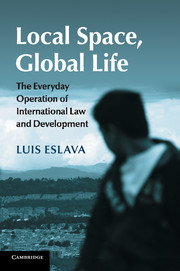Book contents
3 - Development and the nation-state
Published online by Cambridge University Press: 05 August 2015
Summary
I opened the last chapter with former UN Secretary-General Kofi Annan outlining a new model of global order to local mayors attending the UCLG Summit in 2005. According to Annan's description, localities – instead of nation-states – should be the new organizational units for achieving global peace and progress. This chapter examines the historical period preceding this open challenge to the preeminence of the nation-state on the international scene. In particular, I focus my ethnographic gaze here on the development project as a key component of nation-building efforts in the Third World and on the way in which this relation has played out in the context of the Colombian state.
I argue in this chapter that the debunking of the nation-state as the preferred platform for development should be approached neither as a tragedy nor as a radical reconfiguration of the development project. It should instead be seen as part of a long-term quest for the effective deployment of authority over territory and population in the Third World. As Ramón Grosfoguel has argued, development interventions and experimentation should always be understood as part of modernity's struggle, and its forceful attempts, to bring social and institutional life within a particular universal narrative of progress.
That the nation-state was chosen as the commanding structure for the pursuit of development reflects in itself a leap of faith made during the Enlightenment. Starting from the seventeenth century, the construction of each individual as a free, centred subject with rational control over his or her destiny and naturally disposed to perpetual self-improvement occurred at the same time as these same kinds of virtues were assigned to nation-states. Since this time, each nation-state was considered as a sovereign, ‘free to rationally control its progressive development’. In the homology established between individuals and nation-states, the generic category of ‘national populations’ became the object upon or through which nation-states were to demonstrate their capacity for and commitment to improvement. Old concerns about the legitimacy of rulers’ dominion over their territories – the typical concern of both European and Creole elites in the South – were transformed into a series of administrative preoccupations about rationally harnessing and developing the state's forces. In Michel Foucault's words, these new developmental concerns gave birth to a mode of government, a rational art of governing founded on the premise of permanently making ‘the forces of the state increase from within
- Type
- Chapter
- Information
- Local Space, Global LifeThe Everyday Operation of International Law and Development, pp. 91 - 138Publisher: Cambridge University PressPrint publication year: 2015
- 1
- Cited by



